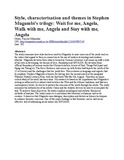Style, characterisation and themes in Stephen Mugambi's trilogy: Wait for me, Angela, Walk with me, Angela and Stay with me, Angela
Abstract
The study examines how style has been used by Mugambi to raise concerns of the youth such as the values that appeal to them in connection to the use of modern technology and modern lifestyle. Mugambi deviates from what is termed as 'Serious Literature' and comes up with a style of his own in developing the themes of love, friendship and HIV/AIDS. He deviates from 'official' boundary of serious works like Chinua Achebe's, Arrow of God, Things Fall Apart and Ngugi wa Thiong'o's, The River Between, and comes up with fiction that depicts the youth of the 21 st Century and the challenges that the youth face. This is shown in language and register that he employs.
Stephen Mugambi is known for having won the second award at the inaugural Wahome Mutahi Literary Prize, with his first book Wait for Me, Angela. Therefore no major critical study of his work has been done. My research is based on the hypotheses that Mugambi's writing is influenced by cultural clash between the West and the African traditions, and that as a contemporary writer, he strives to portray the concerns of the youth through his works. The study examines the authenticity of his artistic vision and the stylistic devices he uses to accomplish the task. To achieve these objectives, the study employs sociological and stylistic theories as methods of analysis.
The study comes to a conclusion that literature is dynamic and so its creators. It observes that Mugambi uses dialogue, description and diction as literary techniques to enhance thematic concerns. One of the major findings is that literature can be used as an effective tool of addressing social issues like HIVIAIDS.
Publisher
University of Nairobi, Kenya

